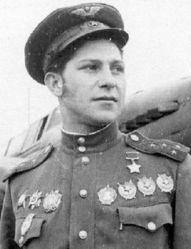
Semion Gurvich
Semion, or Shimon Gurvich was born in 1923 in Rostov-on-Don (Russia) to a family of a Jewish tinsmith. His mother was a cashier. After his birth, the family moved to Voronezh, Russia. There he completed a course of the local "aeroclub.".When he showed the graduation certificate to his mother, she burst into tears: "What, isn't there enough room for you on the earth? You can be an engineer, or a doctor." But Semion answered: "Mom, I want to be a pilot."
[Gershon Shapiro, Ocherki evreiskogo geroizma, vol. 1, Kiev, 1994; p. 192]
In 1940, Gurvich was drafted into the Red Army. Two years later, he graduated as a second lieutenant from the Balashov Military Pilots' School. Although he had been in action from March 1942, Gurvich felt that his real baptism of fire came during the Kursk operation, in July 1943. It was during this battle that he made two-three sorties each day with his attack plane. After this operation, he took part in the Soviet operation at the Dnieper River; and in 1944 – in the liberation of Belorussia. By July 1944, Gurvich made 144 successful sorties. His citation document reported that he had "destroyed 19 enemy tanks, 40 cannons, 95 military vehicles, a locomotive, and 30 freight cars, four military warehouses, several anti-aircraft batteries, and much manpower. He [also] destroyed an enemy fighter plane and other two other places in the squadron."
In June 1944, during the fighting for Bobruisk, Belorussia, a shell hit his plane. It damaged his controls and the plane went into a spin. Several meters before his aircraft hit the ground, the earth, Gurvich managed to regain control and return to his airfield. During the battle for Bobruisk, he was appointed deputy commander of his squadron.
In October 1944, Gurvich was awarded the title of Hero of the Soviet Union. He also received other military awards. In April 1945 Captain Gurvich took part in the fighting over Berlin.
After the war, he served in the Soviet air force. He retired with the rank of colonel in 1966. Then he lived in Rostov-on-Don, where he worked as a trainer of sport shooters.
Gurvich died in 2004.






